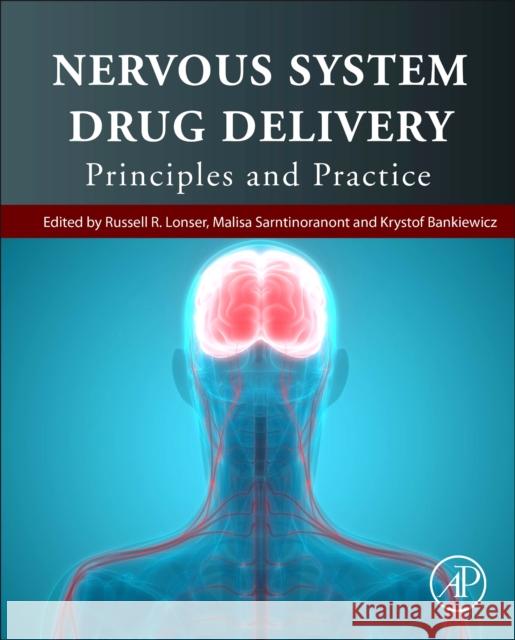Nervous System Drug Delivery: Principles and Practice » książka



Nervous System Drug Delivery: Principles and Practice
ISBN-13: 9780128139974 / Angielski / Twarda / 2019 / 556 str.
Nervous System Drug Delivery: Principles and Practice
ISBN-13: 9780128139974 / Angielski / Twarda / 2019 / 556 str.
(netto: 627,38 VAT: 5%)
Najniższa cena z 30 dni: 639,74 zł
ok. 18-20 dni roboczych.
Darmowa dostawa!
Section I. Physiology of Nervous System Drug Delivery 1. Fundamentals of Brain-Barrier Anatomy and Global Functions 2. Blood-Brain Barrier in Disease States 3. Pharmacokinetics of Systemic Drug Delivery 4. Pharmacokinetics of Drug Delivery Past the Blood-Brain Barrier 5. Anatomy and Physiology of Cerebrospinal fluid Dynamics 6. Pharmacokinetics of Polymeric Drug Delivery 7. Pharmacokinetic Models of Convection-Enhanced Drug Delivery 8. Mechanisms and Clinical Applications of Stem Cell Therapy
Section II. Nervous System Drug Delivery Techniques 9. Intravenous and Intravascular Drug Delivery 10. Blood-Brain Barrier Disruption 11. Ultrasonic Methods 12. Nanoparticles for Brain Tumor Delivery 13. Solute Transport in the Cerebrospinal Fluid: Physiology and Practical Implications 14. Drug-impregnated Polymer Delivery 15. Immunomodulatory Methods 16. Convection-Enhanced Drug Delivery in the Central Nervous System 17. Stem Cell Transplantation for Neurological Disease: Technical Considerations and Delivery Devices 18. CRISPR-Cas Gene Editing for Neurological Disease
Section III. Clinical Application of Nervous System Drug Delivery 19. Drug and Disease-Specific Paradigms for Drug Delivery to the Central Nervous System 20. Dynamic Contrast-Enhanced Magnetic Resonance Imaging in Brain Tumors 21. Clinical Methods of Nervous System Drug Delivery for Tumors 22. Delivery Methods for Treatment of Genetic Disorders 23. Direct Convective of Nervous System Drug Delivery for Patients with Neurodegenerative Disorders 24. Central Nervous System Drug Delivery after Ischemic or Hemorrhagic Stroke 25. Intrathecal Drug Delivery for Cancer Pain
Dr. Russell R. Lonser is Professor and Chair of the Department of Neurological Surgery at Ohio State University. His research interests include the development of drug delivery paradigms for pathologies of the central nervous system, as well as investigation of tumor pathogenesis and biology. His clinical and surgical interests focus on the treatment of brain, skull base, and spinal cord tumors. He is an author on over 300 scientific and clinical publications. He received the Young Investigator Award in 2001, the Mahaley Clinical Research Award from the Joint Section on Tumors in 2013. He was the 2017 American Association of Neurological Surgeons/Congress of Neurological Surgeons Section on Tumors Bittner Lecturer, and was the Edward H. Oldfield Lecturer in 2018 for the American Academy of Neurological Surgery.
Dr. Lonser is co-inventor on a patent for imaging delivery of therapeutic agents in the nervous system. He has served the Congress of Neurological Surgeons as President, a Member-at-Large of the Executive Committee, Scientific Meeting Chair, Annual Meeting Chair, and Treasurer. He has been actively involved in the mentoring and training of over 40 neurosurgical fellows. He is on the editorial boards for Journal of Neurosurgery, Neurosurgery, and World Neurosurgery. He is an Academic Editor for PLoS One and Science Reports, and is a consulting editor for Neurosurgery Clinics of North America.
Dr. Malisa Sarntinoranont is an Associate Professor in the Department of Mechanical & Aerospace Engineering at the University of Florida. Her research is driven by a vision to develop translational tools for patient-specific drug therapy. The focus of her laboratory has been the development of image-based computational models that predict flows and 3D drug distributions within the brain, spinal cord, and tumors. Dr. Sarntinoranont has a background in biomechanical engineering, with specific expertise in transport and soft tissue mechanics. She is an author on over 100 journal articles and conference proceedings. She is a Fellow of the American Society of Mechanical Engineers, and has acted as research advisor for more than 25 graduate students and more than 50 undergraduate students.
Dr. Krystof Bankiewicz has both industry and academic experience, is an inventor on numerous patents related to drug and gene delivery, and has published more than 200 peer-reviewed research articles. He has considerable experience in supervising multi-investigator translational programs and is a Principal Investigator on several multicenter, multi-investigator grants and clinical trials. He has supervised more than 40 postdoctoral fellows and residents.
Throughout his career, Dr. Bankiewicz has maintained a strong focus on the development of translational approaches to gene and drug delivery therapies for the treatment of serious diseases, including brain cancer, Parkinson disease, Huntington disease, Alzheimer disease, pediatric neurotransmitter deficiency, and lysosomal storage disorders. Dr. Bankiewicz developed multiple clinical trials and holds 3 investigational new drug permissions for ongoing trials, using a magnetic resonance-guided convection-enhanced delivery technique. He has developed critical collaborations between academic, government, and industry forces to accelerate development of advanced therapies for the brain and brain tumors. Dr. Bankiewicz co-founded 3 biotechnology companies and holds more than 15 U.S. patents.
1997-2025 DolnySlask.com Agencja Internetowa
KrainaKsiazek.PL - Księgarnia Internetowa









